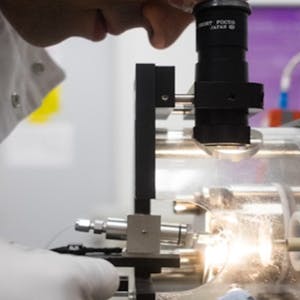Industrial Biotechnology
Fossil fuels have been the primary energy source for society since the Industrial Revolution. They provide the raw material for the manufacture of many everyday products that we take for granted, including pharmaceuticals, food and drink, materials, plastics and personal care. As the 21st century progresses we need solutions for the manufacture of chemicals that are smarter, more predictable and more sustainable.
Industrial biotechnology is changing how we manufacture chemicals and materials, as well as providing us with a source of renewable energy. It is at the core of sustainable manufacturing processes and an attractive alternative to traditional manufacturing technologies to commercially advance and transform priority industrial sectors yielding more and more viable solutions for our environment in the form of new chemicals, new materials and bioenergy.
This course will cover the key enabling technologies that underpin biotechnology research including enzyme discovery and engineering, systems and synthetic biology and biochemical and process engineering. Much of this material will be delivered through lectures to ensure that you have a solid foundation in these key areas. We will also consider the wider issues involved in sustainable manufacturing including responsible research innovation and bioethics.
In the second part of the course we will look at how these technologies translate into real world applications which benefit society and impact our everyday lives. This will include input from our industry stakeholders and collaborators working in the pharmaceutical, chemicals and biofuels industries.
By the end of this course you will be able to:
- Understand enzymatic function and catalysis.
- Explain the technologies and methodologies underpinning systems and synthetic biology.
- Explain the diversity of synthetic biology application and discuss the different ethical and regulatory/governance challenges involved in this research.
- Understand the principles and role of bioprocessing and biochemical engineering in industrial biotechnology.
- Have an informed discussion of the key enabling technologies underpinning research in industrial biotechnology
- Give examples of industrial biotechnology products and processes and their application in healthcare, agriculture, fine chemicals, energy and the environment.
None
Syllabus
Syllabus - What you will learn from this course
Week 1
Enzymes, Enzyme Discovery and Engineering
Week 2
Methods in Systems and Synthetic Biology
Week 3
Biochemical and Bioprocess Engineering
Week 4
Pharmaceuticals and Fine Chemicals
Week 5
Case Studies: Bioenergy and Biomaterials
Week 6
Case Studies: Glycoscience and Biotherapeutics
FAQ
When will I have access to the lectures and assignments?
Access to lectures and assignments depends on your type of enrollment. If you take a course in audit mode, you will be able to see most course materials for free. To access graded assignments and to earn a Certificate, you will need to purchase the Certificate experience, during or after your audit. If you don't see the audit option:
What will I get if I purchase the Certificate?
When you purchase a Certificate you get access to all course materials, including graded assignments. Upon completing the course, your electronic Certificate will be added to your Accomplishments page - from there, you can print your Certificate or add it to your LinkedIn profile. If you only want to read and view the course content, you can audit the course for free.
Is financial aid available?
Yes. In select learning programs, you can apply for financial aid or a scholarship if you can’t afford the enrollment fee. If fin aid or scholarship is available for your learning program selection, you’ll find a link to apply on the description page.
Reviews
such a excellent platform, educators are so well they explained each and every concept in very simplified way.I am very happy to gain a lots of knowledge abot actual industrial biotechnology
Every espensive topic, all the proffersors spoke bodly and detailed with cerdible and understanble sources. And all the test questions perfectily related to the lectures. Amazing.
Everything was way so good. I have some critics on the certificate. The logo of Manchester University is cut uncomplete. Can I have a request for coursera to fix it up? Thank you so much in advance
Very informative and very well organised course and it really helped me provide a good insight into the world of Biotechnology, the applications in the health sector and its potential in the future.
